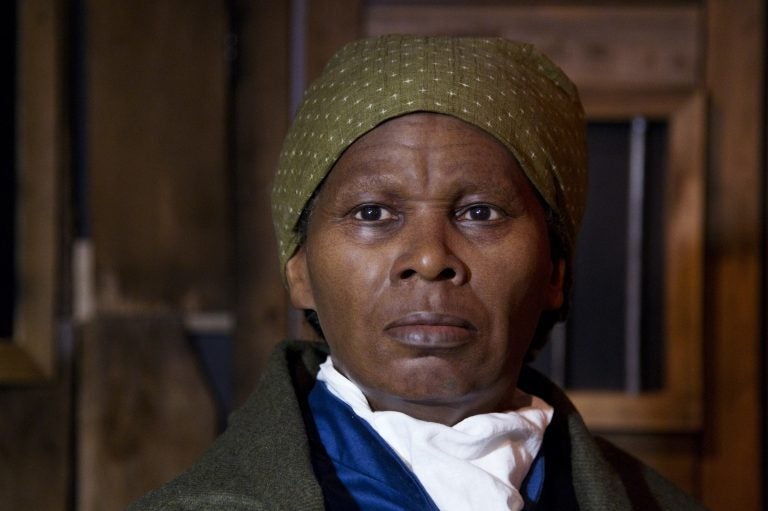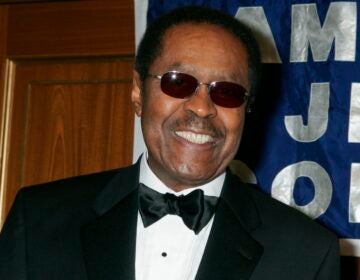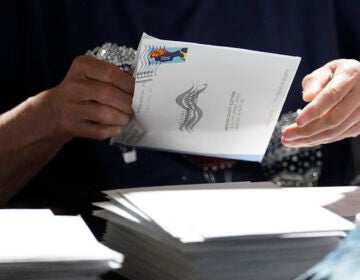Trump banishes Harriet Tubman to the back of the bus
Harriet Tubman, heroine of the Underground Railroad and worker for women's suffrage, was tapped by Obama's Treasury to replace Andrew Jackson on the $20 bill starting in 2020.

A wax likeness of the renowned abolitionist and conductor of the Underground Railroad Harriet Ross Tubman is unveiled at the Presidents Gallery by Madame Tussauds in Washington in celebration of Black History Month, Tuesday, February 7, 2012. (Manuel Balce Ceneta/AP Photo)
I’ll stipulate that whoever’s face graces the $20 bill is not the weightiest issue in America — the metastasizing constitutional crisis trumps everything, as evidenced again yesterday during a Rose Garden rant — but symbols do matter. Symbols help us define who we are as a people, and the story we wish to tell about this nation.
So, with respect to the $20 bill, the choice is between the current facial incumbent, a racist white guy who enslaved human beings, and a black woman who repeatedly risked her life to free human beings.
Take a wild guess who Donald Trump likes better.
Harriet Tubman, heroine of the Underground Railroad and tireless worker for women’s suffrage, was tapped by President Obama’s Treasury secretary to replace Andrew Jackson on the $20 bill starting in 2020. A black woman has never appeared on American currency, and Tubman, who escaped slavery in 1849 and died in 1913, seven years before women finally won the right to vote, was the natural candidate — a symbolic reminder that white men weren’t the only people who built this nation and embraced its values. Jack Lew, the Treasury secretary under Obama, hailed Tubman as “a role model for leadership and participation in our democracy.”
But yesterday — hang onto your hats, because I know this will shock you — Trump Treasury secretary Steve Mnuchin announced that Tubman is being banished to the back of the bus. Andrew Jackson, the slaveholder who stole land from Native Americans, will stay on the currency at least until 2028.
The ostensible reason, at least according to Mnuchin, is that Treasury’s first priority is to tinker with the $20 bill’s design in order to address unspecified “counterfeiting issues.” When asked yesterday, during a congressional hearing, whether he personally believes that Tubman should appear on the money, he replied: “I’ve made no decision as it relates to that.”
Naturally, he was just blowing smoke for his boss. Trump’s ‘tude about Tubman has been obvious since 2016, when he told NBC’s “Today Show” that the plan to put her on the $20 upset him greatly: “I don’t like seeing it. I think it’s pure political correctness.” (The reality of American racial diversity, in his mind, is “political correctness.”) And he reportedly was blunter in conversation with White House aides. According to Omarosa Manigault Newman, the ex-aide who last year wrote the book “Unhinged,” Trump told her what he really thought about Tubman: “You want me to put that face on the $20 bill?”
The story that Trump and his followers tell themselves is that white supremacy built this nation for the better.
Trump, early in his tenure, visited Andrew Jackson’s grave and tweeted, “We honor your memory. We build on your legacy.” It was legacy of oppression, as vividly rendered in the recent book “Jacksonland.” One random passage: “Jackson’s style of negotiating (with Native Americans) was frank and coercive. In talk after talk over the years, he told native leaders he was their friend, and that he wanted to pay for their land — but that if they failed to sell, white settlers would take their land for nothing.” Jackson, his family members, and his closest business associates, ultimately stole more than 45,000 acres.
Trump loves Jackson so much that in 2017 he offered this unique history lesson: “It was during the Revolution that Jackson first confronted and defied an arrogant elite.” Permit me to offer some salient facts. When the Revolution broke out, Jackson was eight years old; when the British surrendered at Yorktown, he was 14.
There are bipartisan proposals in Congress to force Treasury to print Tubman’s face on all new twenties starting in 2021, but those bills are DOA as long as Trump is around. He and his fans can’t abide someone like Tubman, who said that “slavery is the next thing to hell.” Their narrative of America whitewashes a black woman who escaped slavery but returned to the South more than a dozen times to free hundreds of others; a woman who spied for the Union Army during the Civil War (dramatized last year in an episode of the TV show “Timeless”); a woman who preached hope to people of color during the darkest years of Jim Crow. She once said:
“Every great dream begins with a dreamer. Always remember, you have within you the strength, the patience, and the passion to reach for the stars to change the world.”
She was right on the money.
—
Regarding yesterday’s Rose Garden rant:
At one point, Trump said that he “doesn’t do coverups.” I found that remark to be quite puzzling. How can a guy who pays hush money to porn stars and mistresses, who committed 10 documented obstructions of justice (according to the Mueller report), who’s stonewalling all congressional subpoenas, and who’s suing in court to halt the release of his financial records, nevertheless claim that he “doesn’t do coverups”?
He said he won’t work with House Democrats — on bills to fix our roads and bridges, or anything else — if they keep investigating him. He tweeted: “You can’t investigate and legislate simultaneously. It just doesn’t work that way.”
As Sam Cooke sang, “Don’t know much about history.”
In 1973 and well into 1974, Congress was busy investigating Richard Nixon — but it also passed lots of legislation that Nixon signed. Nixon, for all his faults, did not hold the American people hostage. It actually worked this way: the Federal Aid Highway Act, the Domestic Volunteer Services Act (creating the VISTA program), the Legal Service Corporation Act (creating legal aid for the poor), the Health Maintenance Organization Act, the Endangered Species Act, the Comprehensive Employment and Training Act, and at least a half dozen more.
Was Trump unaware in 1973 that investigations and legislation can happen simultaneously? You bet. He was busy fighting a racial discrimination suit filed by Nixon’s Justice Department, which accused the Trump Organization of “refusing to rent and negotiate rentals with blacks, requiring different rental terms and conditions because of race, and misrepresenting that apartments were not available.”
Harriet Tubman would’ve been disgusted.
WHYY is your source for fact-based, in-depth journalism and information. As a nonprofit organization, we rely on financial support from readers like you. Please give today.




